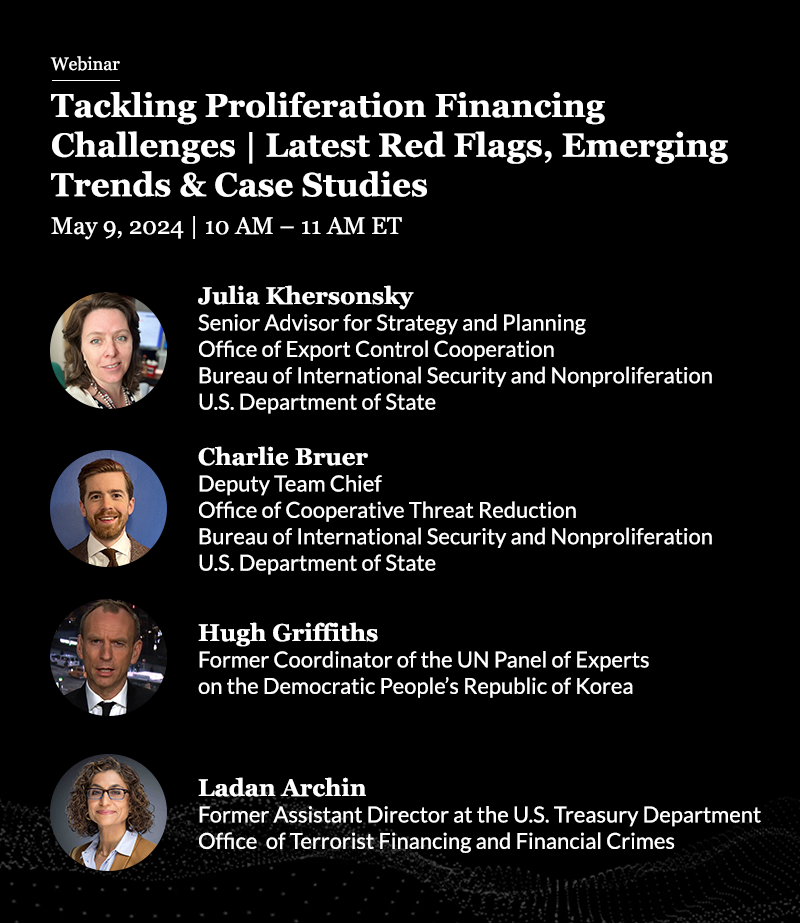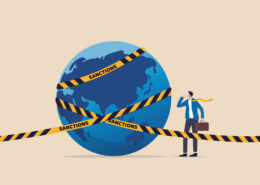Counterproliferation Finance Detection and Deterrence
What Can Financial Institutions Do?
📅 April 23, 2024
📅 April 23, 2024
The Justice Department in late 2022 charged two companies and six individuals for allegedly selling and exporting powerful dual-use technologies to Russia, including a high-precision export-controlled item that can be used for Russia’s nuclear proliferation. Some of the electronic components purchased by the network and sold to sanctioned Russian end-users were discovered in Russian weapons platforms on the Ukrainian battlefield. The case highlights how illicit actors use deceptive practices to mislead financial institutions into participating in schemes to send critical military equipment and dual-use technologies to military end-users in Russia.
In its 2024 National Proliferation Financing Risk Assessment, the U.S. Treasury identified proliferation networks operating on behalf of Russia, North Korea, China, Iran, Syria, and Pakistan as threats to U.S. national security. These networks exploited the U.S. financial system to finance the proliferation of weapons of mass destruction (WMD), including financing to procure WMD components and raising revenues to support efforts by these state actors to advance their WMD activities. Treasury identified Russia and North Korea as the highest-risk threat actors because of the scope and sophistication of their efforts.
Because of heavy battlefield losses Russia has experienced since it began its full-scale invasion of Ukraine in early 2022, Moscow has engaged with close partners to replenish its stocks of conventional weapons. Those losses have also increased Russia’s reliance on its nuclear, cyber, and space capabilities to maintain deterrence and project power globally, according to the Treasury assessment.
North Korea since 2022 has continued to augment its WMD capability, including testing of multiple types of intercontinental ballistic missiles (ICBMs), according to the Director of National Intelligence (DNI) 2024 Threat Assessment. North Korea remains dedicated to expanding its nuclear capability, as well as enhancing its conventional missile capabilities, and will use both its offensive cyber capabilities and conventional trade control and sanctions evasion methodologies to steal and launder billions of dollars in cryptocurrencies to fund its WMD programs.
Non-state actors, such as terrorist groups are also working to acquire WMD capabilities, according to the Treasury risk assessment. The United States in March 2023 released a National Security Memorandum (NSM) on WMD Terrorism and Advance Nuclear and Radioactive Material Security. The NSM seeks to provide a framework to prevent non-state actors from acquiring WMD and related materials. However, Treasury has not assessed that the efforts of non-state actors to acquire WMDs have involved exploitation of the U.S. financial system.
Given the complex nature of the activities to hide proliferation financing, what can financial institutions do? The Financial Action Task Force (FATF) has provided indicators that could denote illicit activity and help financial institutions and other stakeholders identify high-risk customers and transactions. Some of these red flags are common methodologies used in sanctions and trade control evasion, fraud, and other financial crimes.
Although many of the indicators provided by FATF are also red flags that may denote trade-based money laundering, sanctions evasion, and other financial crimes, when coupled with the involvement of entities in jurisdictions at high risk of diversion or WMD proliferation, these red flags should be closely examined for possible proliferation concerns. The more indicators are present, the riskier the transaction. Financial institutions should monitor these transactions to detect and deter possible proliferation financing.
The size and sophistication of the U.S. financial system makes it particularly vulnerable for exploitation by illicit proliferation networks, and new technologies continue to enable illicit money transfers by malign actors. These actors use a combination of tried-and-true techniques and innovative strategies and technologies to transfer sensitive goods to restricted actors.
Financial institutions and virtual currency service providers must be aware of the emerging trends used by illicit actors—especially Russia and North Korea—to access restricted technologies and raise revenues for their WMD programs. Closely monitoring risky transactions, researching new proliferation financing methodologies, and putting together pieces of the counterproliferation puzzle will help avoid enforcement actions and secondary sanctions.
Over the past six months, the Russian Federation has vetoed a renewal of UN sanctions against Iran’s ballistic missile and UAV program, as well as a resolution extending the mandate of the UN Panel of Experts monitoring the sanctions on North Korea, while at the same time importing Iranian and North Korean UAVs and ballistic missiles for use in its war against Ukraine.
Russia’s vetoes have effectively dismantled the multilateral sanctions framework on Iran and abolished multilateral sanctions monitoring capabilities for North Korea. Russia’s procurement of North Korean ballistic missiles and Iranian UAVs in Ukraine further heighten proliferation finance and sanctions risk for the private sector.











 Digital Assets in the Crosshairs
Digital Assets in the CrosshairsThis site uses cookies. By continuing to browse the site, you are agreeing to our use of cookies.
Accept settingsHide notification onlySettingsWe may request cookies to be set on your device. We use cookies to let us know when you visit our websites, how you interact with us, to enrich your user experience, and to customize your relationship with our website.
Click on the different category headings to find out more. You can also change some of your preferences. Note that blocking some types of cookies may impact your experience on our websites and the services we are able to offer.
These cookies are strictly necessary to provide you with services available through our website and to use some of its features.
Because these cookies are strictly necessary to deliver the website, refusing them will have impact how our site functions. You always can block or delete cookies by changing your browser settings and force blocking all cookies on this website. But this will always prompt you to accept/refuse cookies when revisiting our site.
We fully respect if you want to refuse cookies but to avoid asking you again and again kindly allow us to store a cookie for that. You are free to opt out any time or opt in for other cookies to get a better experience. If you refuse cookies we will remove all set cookies in our domain.
We provide you with a list of stored cookies on your computer in our domain so you can check what we stored. Due to security reasons we are not able to show or modify cookies from other domains. You can check these in your browser security settings.
These cookies collect information that is used either in aggregate form to help us understand how our website is being used or how effective our marketing campaigns are, or to help us customize our website and application for you in order to enhance your experience.
If you do not want that we track your visit to our site you can disable tracking in your browser here:
We also use different external services like Google Webfonts, Google Maps, and external Video providers. Since these providers may collect personal data like your IP address we allow you to block them here. Please be aware that this might heavily reduce the functionality and appearance of our site. Changes will take effect once you reload the page.
Google Webfont Settings:
Google Map Settings:
Google reCaptcha Settings:
Vimeo and Youtube video embeds:
You can read about our cookies and privacy settings in detail on our Privacy Policy Page.
Privacy Policy